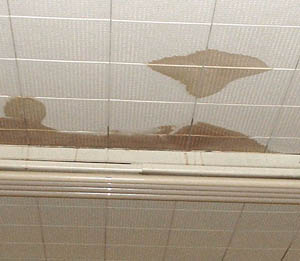THE PRIME SITUATIONS IN WHICH SILICONE WORKS BEST
There are several common situations in which silicone works best and saves the building owner a significant amount of money. These situations are our sweet spot and are where we provide the most value to our customers. We love roofs in these two situations.
The Roof is Out of Warranty
When a roof goes out of warranty, it is a giant gray cloud looming over the building owner’s head. “Will something go wrong that I have to pay for this year?” becomes a very common thought that can keep the building owner up at night. So, when a roof goes out of warranty, silicone works best as an effective way to renew the warranty and provide that peace of mind to the building owner.

The Roof is Leaking
Another situation in which silicone works best is when the building is leaking to the point that it shouldn’t be “spot repaired” because there would be patches everywhere. In these cases, a silicone roof coating is very cost-effective while also provide excellent leak protection that will last 15-20 years.
In any situation in which our roof coatings are applied, there are two major conditions of the roof that help the process go much more smoothly and make it a great project for the building owner.
The Roof Should Be in Good Structural Condition
Our coating doesn’t provide any strength to the building once it is installed, it simply adopts the properties of the substrate it is applied to. So, if your building is liable to collapse at any minute, a silicone coating isn’t a good fit because the roof will still collapse after the coating is installed. However, if your roof is in good structural condition but is just leaking or out of warranty, a silicone coating is perfect.
Silicone Works Best When the Roof Is Mostly Dry
We also want the roof surface to be completely dry, and the insulation and roof deck to be mostly dry. We can handle some wet under the roof substrate, but if it’s just totally waterlogged, our coating will trap that water in there and your insulation will be ineffective and you may have leaks continue for a period of time while the water runs out. We have methods of removing moisture from the roof layers, but it’s much more cost-effective if the roof is already mostly dry.
Conclusion
Silicone beats acrylic in just about every situation, but those mentioned above are our “bread and butter” where our product provides the best value to our customers and they walk away the most satisfied. If you’ve got a leaking roof or a roof that is no longer under warranty, give us a call and we’d love to inspect it and tell you if we think it’s a good fit for our product.